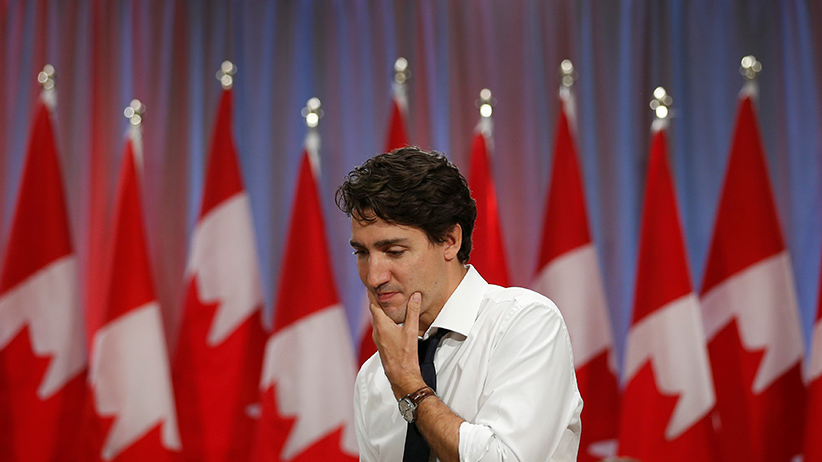Trudeau’s zeal for electoral reform fell with his own electoral success
Liberals figured when they won, public satisfaction with the voting system was restored
Canada’s Prime Minister Justin Trudeau takes part in a town hall with high school students in Ottawa, Ontario, Canada, November 3, 2016. (Chris Wattie/Reuters)
Share

Prime Minister Justin Trudeau’s about-face today on electoral reform is such a blatant breaking of an unambiguous campaign commitment that it’s tempting to speculate he never meant to keep this promise all along. What’s more likely to have happened, though, isn’t that Trudeau knowingly lied from the start, but that he conveniently lost enthusiasm for reform with changing political circumstances.
Trudeau first promised to get rid of the old familiar first-past-the-post voting system back in the spring of 2015. That was, as political obsessives will recall, a testing season for him. The federal NDP had bounced back dramatically in the polls, challenging Trudeau’s status as the main alternative to Stephen Harper, thanks largely to the election of their provincial social-democrat cousins in Alberta. Chances of Trudeau’s Liberals scoring a clean win in the coming fall election seemed to be receding.
That was the backdrop when Trudeau announced an ambitious package of democratic reform proposals, including the signature pledge to get rid of first-past-the-post, if he was elected. I ask him about it in an interview. He was clear, in my opinion, that foremost in his mind was the discouraging possibility of the Conservatives again winning a majority, as they had in 2011, with a minority of the popular vote, thanks to vote-splitting between the Liberals and NDP.
“I think as we look at declining voter turnout,” Trudeau said, “as we look at the fact that people are increasingly aware that a majority government was given to a party that 60 per cent of Canadians, not only didn’t vote for, but actively tend to dislike, there’s a real question about how we are valuing our votes.”
As it turned out, of course, the NDP botched their fall campaign, and the Tories were stuck with their base, while Trudeau’s Liberals soared to victory in a brilliant campaign. Shortly after the new Prime Minister was sworn in with his first cabinet, I interviewed then-house leader Dominic LeBlanc (now fisheries and oceans minister) about the electoral reform file, which Trudeau had assigned him to help spearhead.
To my surprise, LeBlanc candidly mused about how voters suddenly seemed to him much less discontented with the old-fashioned way of electing MPs—now that the system had allowed them to install the Liberals back in power. “I actually think if you look at the support that Mr. Trudeau and his government and his caucus have, people seem happy,” he said. “I’m seeing all over the place that they are shocked that they could change a government.”
The pressure to overhaul the way we hold elections, it seemed, was off. In any case, if there was to be electoral reform, LeBlanc said the Liberals couldn’t reasonably just use their majority to push it through over the objections of the other parties. “I never thought that one party with a majority rewrites the rules that apply to everybody else,” he said.
The saga of how the Liberals dragged their feet on getting the electoral-reform process rolling has been extensively covered. Still, Trudeau kept insisting that he was serious about making good on his promise—that is, until he was questioned last fall by Le Devoir on the issue. In that interview, his old key point from the spring of 2015—the notion that discontent with the electoral system was largely a side effect of the success of Stephen Harper’s Conservatives—popped up again.
“Under Mr. Harper, there were so many people dissatisfied with the government and its approach that they were saying, ‘We need an electoral reform so that we can no longer have a government we don’t like,'” he said. “However, under the current system, they now have a government they are more satisfied with, and the motivation to want to change the electoral system is less urgent.”
The likelihood that a partisan’s zeal for electoral reform will rise and fall according to success or failure in elections is hardly a fresh thought. A paper called “Getting From Here to There: A Process for Electoral Reform in Canada,” published by the Montreal-based Institute for Research on Public Policy in 2001, put it this way: “There is, not surprisingly, a close correlation between parties’ positions on the need for change and their expected benefit from any new system.”
As it happens, one of the three authors of that usefully skeptical IRPP paper happened to be Matthew Mendelsohn, who was later an architect of the 2015 federal Liberal platform, and still later appointed by Trudeau as a top federal bureaucrat, with special responsibility in making sure the platform’s promises are kept. Not all of them, though, as we were reminded again today.